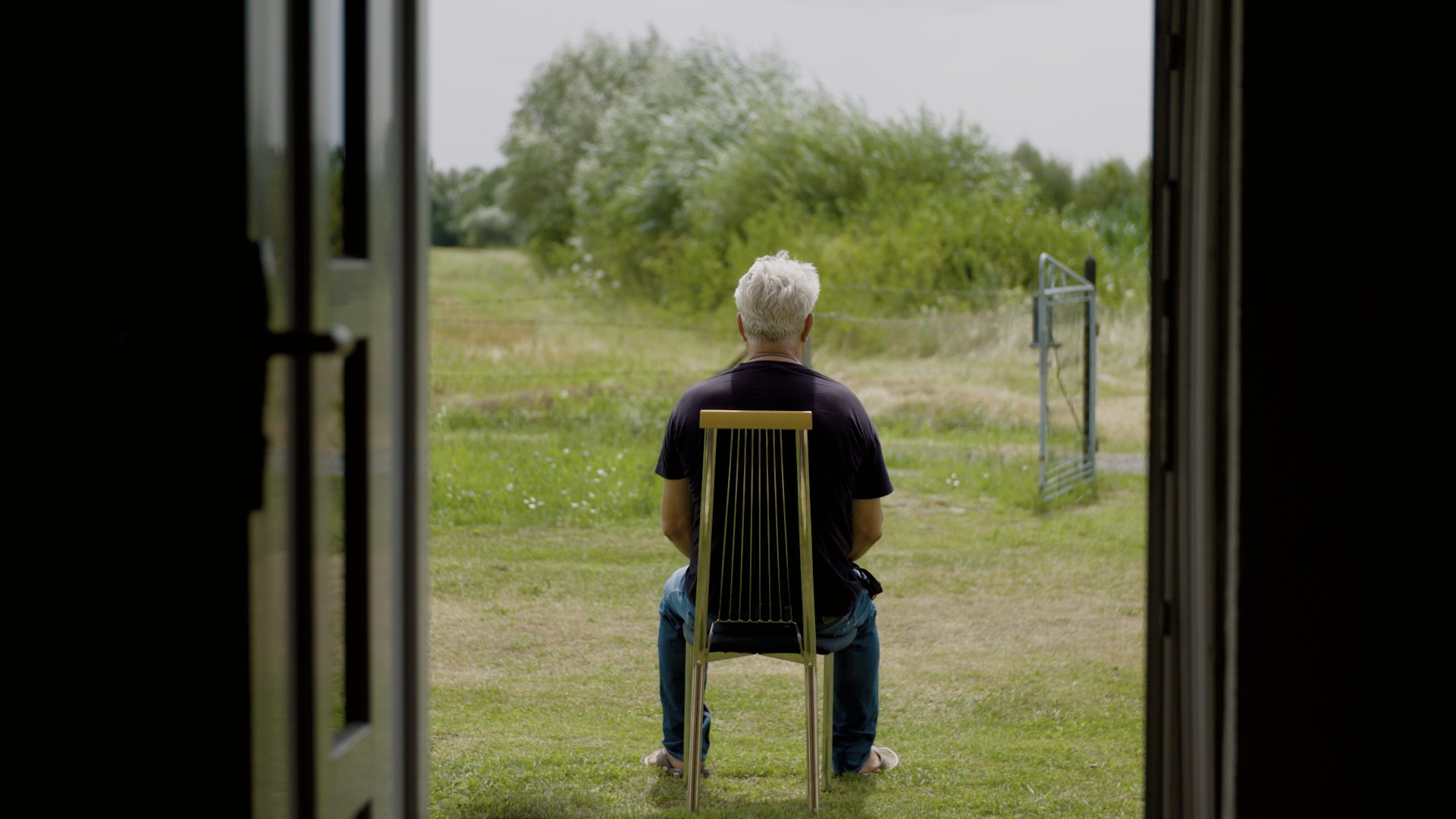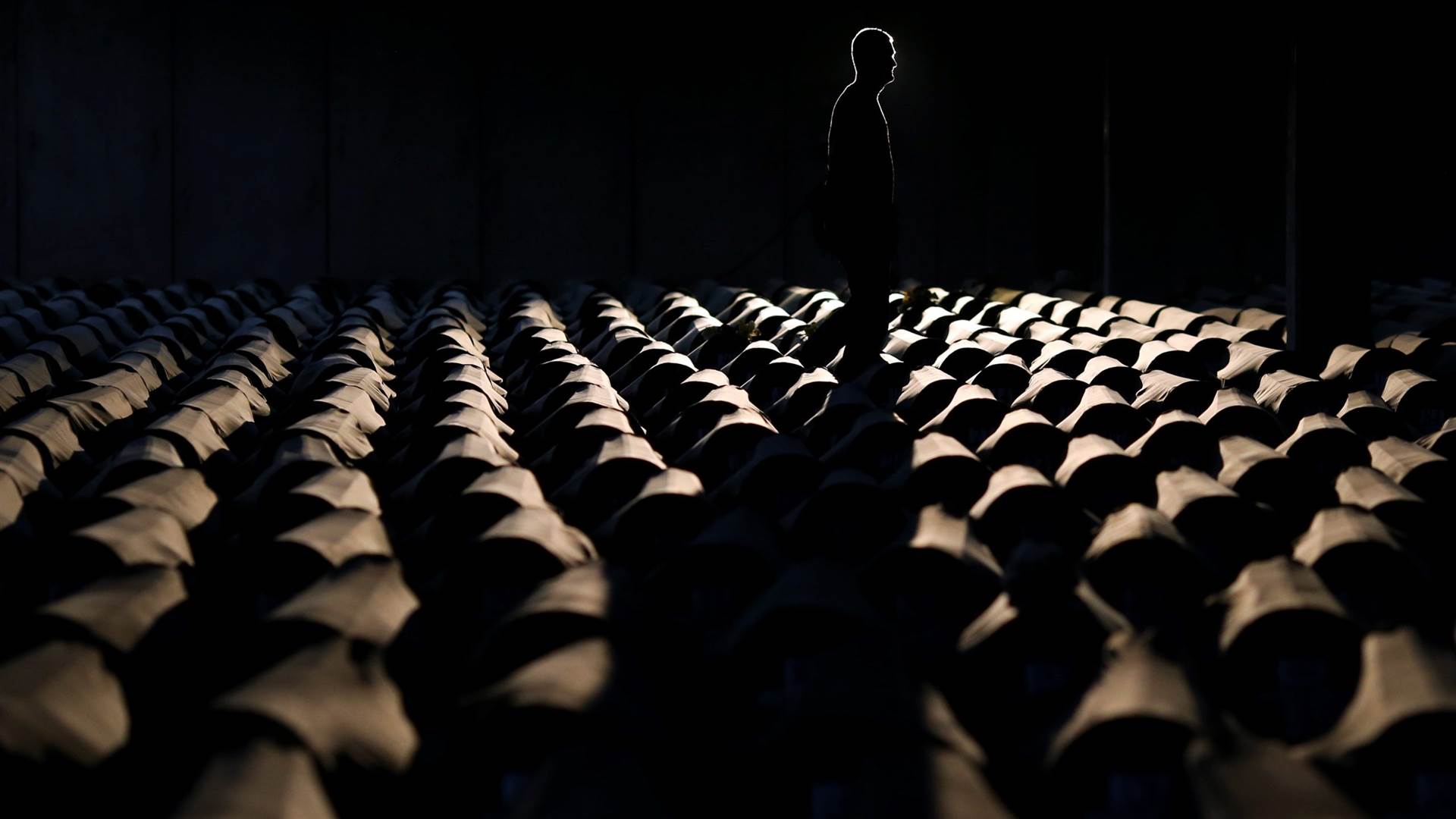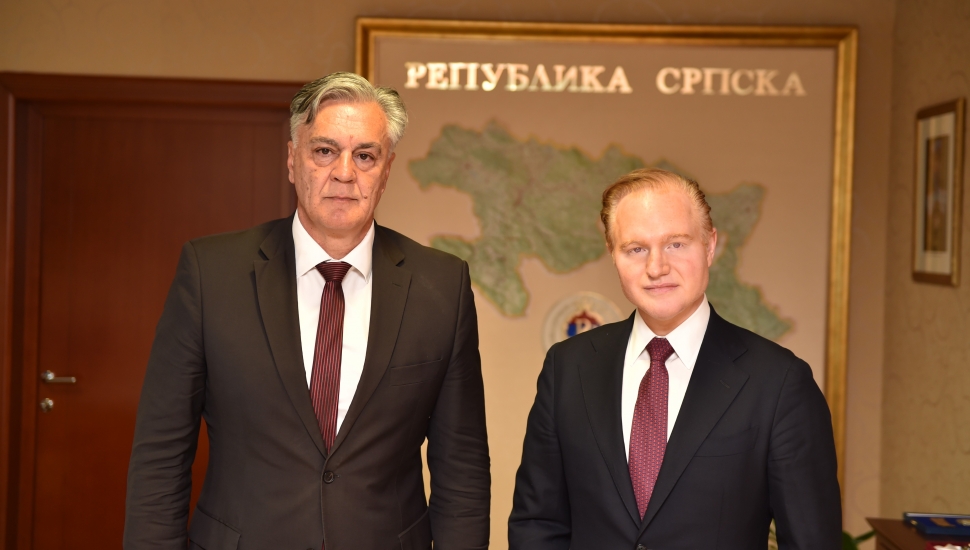This post is also available in: Bosnian
Due to public pressure, on October 17, 2022, Huseynova herself was released from a pre-trial detention centre in Donetsk, where she was being held together with criminals and repeat offenders. She was freed through a prisoner exchange between Ukraine and Russia, and is now the head of the Communications Department of SEMA Ukraine, a community of women survivors of sexual violence in conflict.
Female prisoners in Russian prisons are subjected to torture and sexual crimes on a daily basis, and many have been separated from their children, said Huseynova. One of them is a woman from Donetsk with whom she shared a cell. The Russian occupiers accused the young woman of “espionage” and imprisoned her in 2020, when her son was four years old.
“Three years later, she was allowed to leave the courtroom with a judgement deferred for 12 years, until her child came of age. She was prohibited from leaving the occupied territory, communicating or using the internet,” Huseynova told Detektor.
“When she ran out of the courtroom to hug her child, her son was scared. He hid behind his father and shouted, ‘I’m afraid of this woman, I don’t know her’,” she added.
Huseynova said that the woman does not have access to psychological and medical care in the occupied territories, and that she struggles with prison traumas and trying to get her child to know and love her again.
Prison guards use threats and blackmail to force women prisoners into sex in exchange for food and better conditions, Huseynova said.
“They tell them: ‘If you come with us now, we will not beat you and we will give you something to eat.’ I personally saw when a woman was told: ‘Do you want to see your children?’” she said, adding that the prisoner was brought back drunk in the morning, crying inconsolably and blaming herself.
“After a few days, they allowed her to see her children. They took off her handcuffs and gave her normal clothes, and she spent two hours with her children,” she added.
As of October 1, 2024, 321 people have been registered with the National Social Service of Ukraine as survivors of sexual violence in conflict. Of these, 186 are women, 128 are men, six are girls aged seven to 17, and one is a male minor. But the United Nations has warned that there may be as many as 20 to 30 times more unregistered cases.
Invisible weapons of war
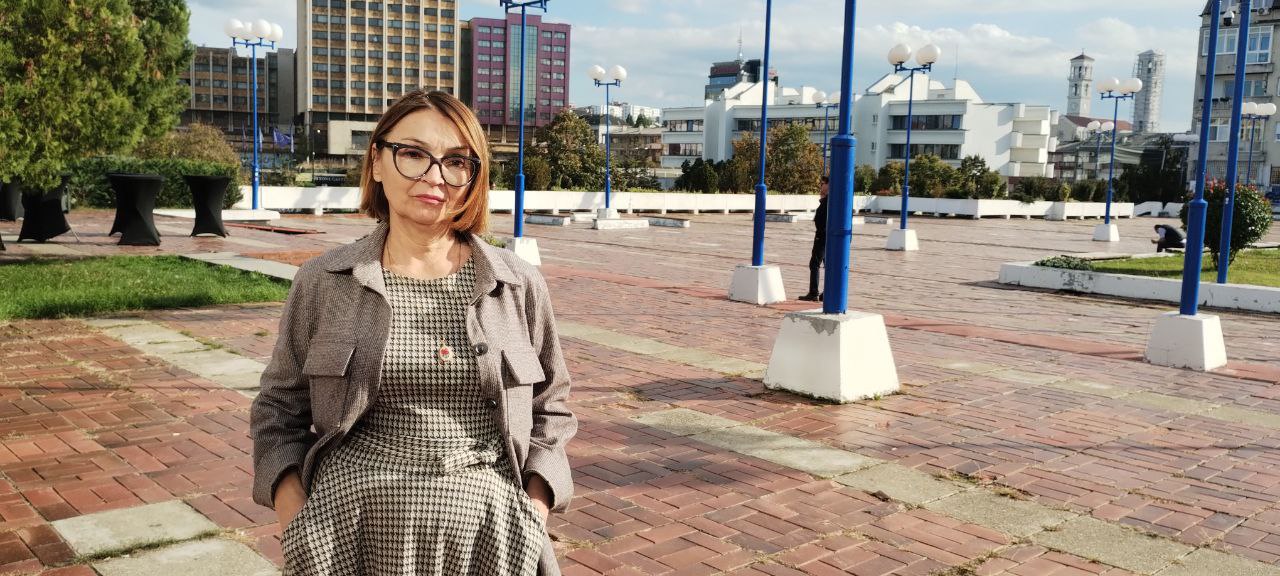 Liudmyla Huseynova. Photo: BIRN BiH
Liudmyla Huseynova. Photo: BIRN BiH
The founder and director of SEMA Ukraine, Iryna Dovhan, recently spoke at the 25th International Conference of the Kosovo Centre for Rehabilitation of Torture Victims in Pristina, along with Huseynova, saying that detainees experience trauma from the very moment of imprisonment.
“A minute ago, you were still an independent, free person. Then they put you in handcuffs, put a bag on your head, and you stop being human. You become a creature that can be stamped and crushed,” Dovhan said.
“You don’t know what’s going to happen to you the next moment. You never know what will come into the mind of these armed, drunk people who don’t recognise any rules and laws.”
In 2014, Dovhan spent several days in the captivity of pro-Russian separatists. She was saved by a picture of her that was taken in Donetsk by Brazilian photographer Mauricio Lima, who captured the moment when a frenzied crowd was mocking a woman tied to a pole. The photograph of Dovhan made it onto the front pages of media outlets around the world. Within a few days, she was released.
Her hometown of Yasynuvata was then occupied by paramilitaries, Russian mercenaries and local collaborators. Dovhan, who was a Ukrainian patriot, took food, blankets, clothing and medicine to Ukrainian soldiers, along with another woman. Another cooked meals and several others donated money for medicines. But the pro-Russian militants found out about it.
“I was betrayed by a man who often visited our home. He said he knew a woman who was helping the Ukrainian Army. It saved his life, and I was arrested. But I’m trying to forget what I went through in captivity,” said Dovhan, who was held in captivity long before the full-scale Russian invasion of Ukraine in 2022.
While trying to forget the trauma, Dovhan talks about how Russian soldiers now use sexual violence to humiliate and intimidate the population, to weaken their will to resist. She recalled a couple from the city of Kherson, who lived next door to a neighbour who was raped by Russian occupiers.
“The man heard screaming, but he couldn’t come to help because there was a curfew in the city. There were several Russian soldiers with submachine guns, and he was unarmed. After the incident, he started drinking. At night, he would hear his neighbour’s screams. He suffers because he was unable to protect her,” said Dovhan, who participated, as a volunteer, in documenting testimonies of Russian war crimes in the Kyiv region.
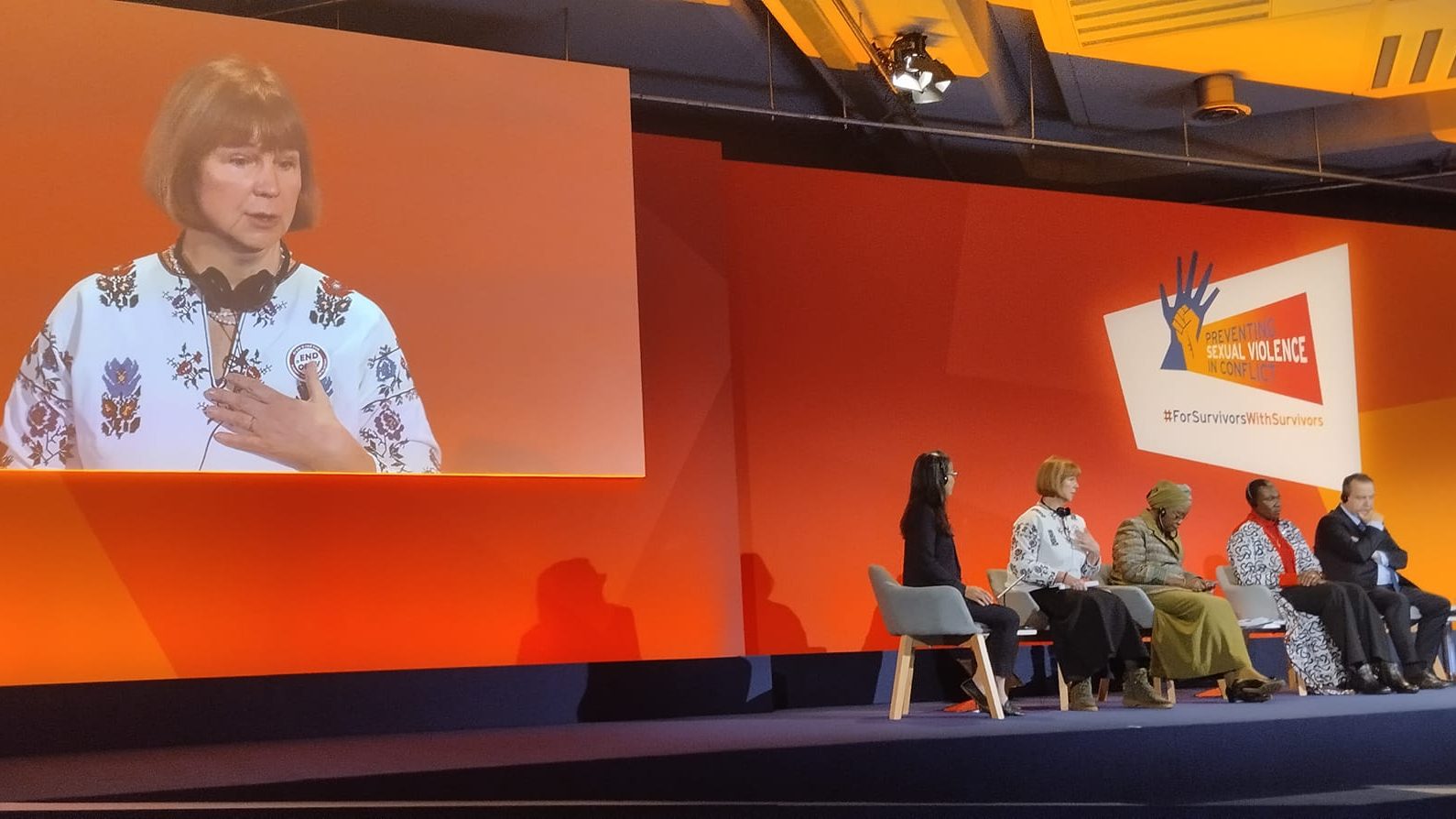 Iryna Dovgan. Photo: BIRN BiH
Iryna Dovgan. Photo: BIRN BiH
Sergiy Nizhynskyi, a human rights activist who heads an NGO called UA Experts, said that rape was used as a weapon of war by invading Russian forces.
“Their emperor would order that everything be plundered, and they could take for themselves whatever was plundered. After 50,000 Russian troops entered the Ukrainian cities of Kyiv, Irpin and Bucha, mass rapes began. Children were raped in front of their mothers,” he said.
Nizhynskyi said that, after the start of the full-scale invasion, between February and March 2022, 12 children, the youngest of whom was four years old, were sexually abused by Russian troops in the Kyiv region.
He claimed that 70 per cent of the survivors of sexual violence committed in the conflict in Bucha were men, without providing official data.
The Ukrainian government’s commissioner for gender policy, Kateryna Levchenko, said that behind every identified case sexual violence in the conflict, there are dozens of similar crimes, but the victims keep quiet about them out of shame or fear of social stigmatisation.
Huseynova said that such stigmatisation is a legacy of the totalitarian Soviet system.
“Society condemned women . Even if a woman wanted to go to law enforcement bodies, her family members would forbid her from doing so,” she said.
State help absent
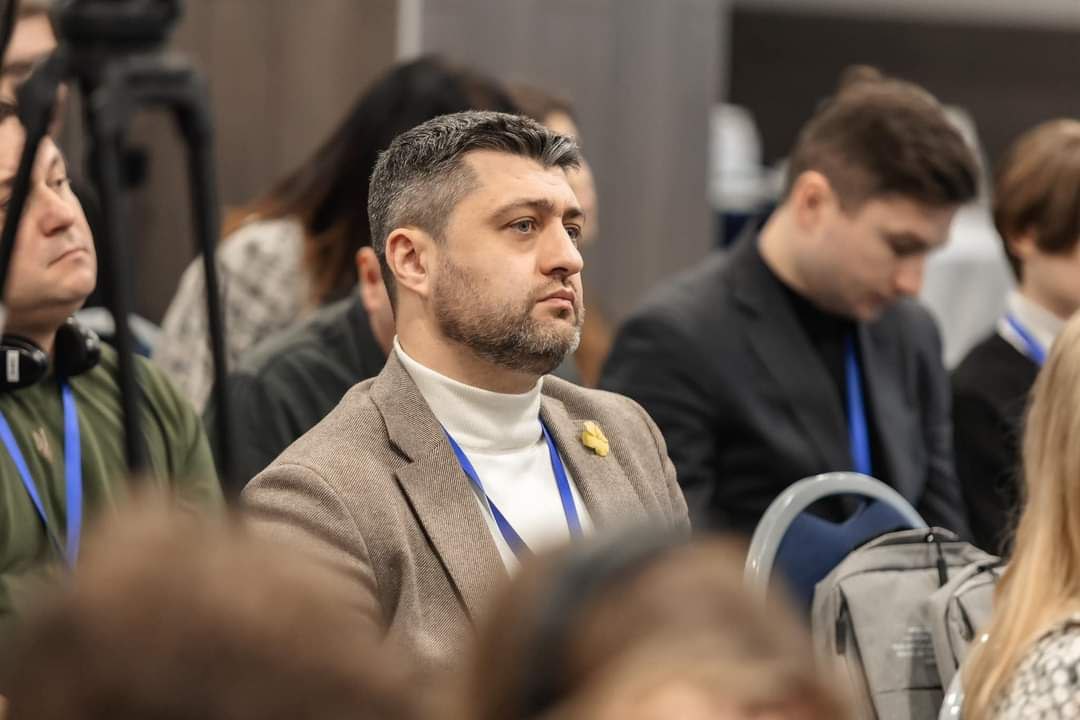 Sergiy Nizhynskyi. Photo: BIRN BiH
Sergiy Nizhynskyi. Photo: BIRN BiH
Dovhan has used the experience she survived into a weapon, she said at the conference in Pristina. She explained that she has repeated this message at workshops and training courses for women survivors of violence that her organisation has held in local communities.
“The main message: turn your trauma into post-traumatic growth. I survived the same thing, so it’s easy for me to convey this message to other women, because I myself am an example of that,” she said.
Her organisation now has 60 members.
“This civil society organisation provides support to new survivors of violence and teaches them how to turn their own trauma into something to fight with,” said Dovhan.
But none of this would have happened had an associate of the Mukwege Foundation not approached Dovhan at the International Court of Justice in The Hague in 2018, telling her that their organisation was ready to admit Ukrainian women as members.
“In 2014, I was left without any help from the state … No one from the prosecutor’s office asked me what I had been through. Only with the help of the Mukwege Foundation have Ukrainian women realised that until our state has recognised us, we will not exist for the rest of the world,” she said, adding that it was only in 2020 that the Ukrainian state prosecutor’s office documented the first testimonies of sexual violence.
Huseynova said that it is necessary to introduce provisions on sexual violence in conflict into Ukrainian legislation and create the legal status of sexual violence survivor.
“There are norms about sexual violence, gender-based violence and inhumane behaviour during a military conflict. But there should be an article of law that will define sexual violence in conflict as a war crime. There should be a clear and understandable system of interaction with the international legal system, with international structures, with Interpol,” she said.
She said she considers it inappropriate to start counting the number of survivors from the start of Russia’s full-scale invasion of Ukraine in 2022, as the war actually began in 2014 with the illegal annexation of Crimea and occupation of part of the eastern Donbas region.
How to protect survivors
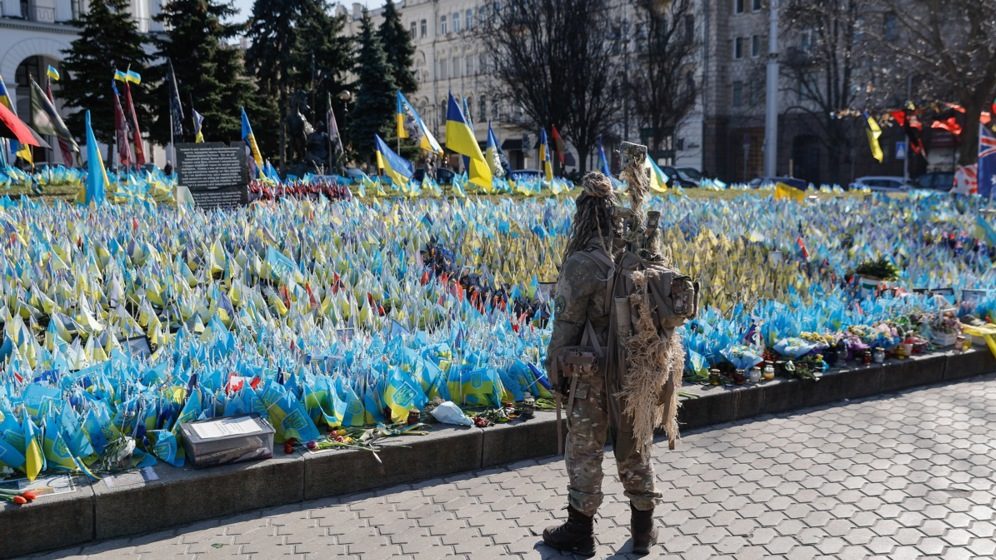 Ukrainian woman soldier on Indepencence Square on the occasion of International Women’s Day in the center of Kyiv, March 8, 2024. Photo: EPA-EFE/SERGEY DOLZHENKO
Ukrainian woman soldier on Indepencence Square on the occasion of International Women’s Day in the center of Kyiv, March 8, 2024. Photo: EPA-EFE/SERGEY DOLZHENKO
Huseynova said that after having been released from captivity, she and other women were questioned by prosecutors, but were not prepared in advance for the questions that the prosecutor would ask them.
The prosecution then put together a collective case, but Huseynova said that it does not properly represent what the victims suffered.
“Our individual stories and traumas were lost in it,” she said. “ advised me to go to the main prosecutor’s office to conduct separate criminal proceedings, because in addition to torture and unlawful imprisonment in inhumane conditions, there were also crimes that we now classify as sexual violence during the armed conflict.”
She hopes that her individual case will eventually end up in court. A year and a half after her release from captivity, she underwent a psychological and psychiatric expert examination as part of the investigation.
“For me, these were exhausting procedures. It had to be proven that this was really a great trauma for a survivor of sexual violence in captivity. It was determined through the examination that I had a diagnosis of PTSD,” said Huseynova.
Two years ago, she and other women prisoners who had been released were taken to a military hospital for further examination. During the first examination, no one took into account their psychological state. The medical staff did not know that these were people who had returned from captivity and could be suffering from the consequences of sexual violence.
“It was very stigmatising for me when they touched my body. I could not go to a gynaecologist for an examination. I was vulnerable, and I couldn’t do it,” she said.
She said that that it is important to have understanding for survivors, but also knowledge of how to work with them.
“How do you explain someone that they need to be examined and that it will be recorded? Why do I have to go through this difficult expert examination? How soon will the case go to court? And how will I feel in court, because I have to testify in court again?” Huseynova said, describing what she was thinking at the time.
She believes that it is enough for survivors to go through their testimonies once, and it should then be entered into a database and kept available for 20 years so the witness can file a criminal complaint at any time, and not be forced to go through everything again. This is an example of the good practice implemented by the state of Congo, she explained.
Human rights activist Nizhynskyi called for a reduction of the number of traumatic contacts to a minimum, in order to avoid the retraumatisation of survivors.
“Imagine talking to a lawyer, talking to a prosecutor, talking to a representative of the ombudsman, and then comes the trial. The number of examinations should be kept to a minimum. Recorded once, and that’s it. Don’t mistreat people,” he said, adding that sexual violence in conflict is a type of crime where the procedure for collecting evidence from survivors should be simplified as much as possible.
Above all, people who have been subjected to sexual violence in conflict need social welfare, he continued, and only should the authorities think about how to prosecute the perpetrator.
“Every woman who has given birth to a child as a sexual violence survivor, or who has experienced or witnessed a sexual crime, thinks about how she will be able to feed her child, how she will get help from the state,” said Nizhynskyi.
Ukraine’s Help Centres provide a series of services to survivors of sexual violence in conflict. These include information, counselling, socio-psychological rehabilitation, social support and safe house and free legal aid.
There is also a one-off state allowance of 3,000 euros for survivors of sexual violence in conflict. Payments have been provided to 500 people. Each individual application is considered by a commission that is part of Ukraine’s National Social Service.
Nizhynskyi expressed concern that the commission has enabled the disclosure of survivors’ personal data.
“How is personal data protected when requests are referred from the prosecutor’s office to the social service for payment? How does the process of making a fair decision take place?” he asked.
He also expressed concern that Russia could use the issue for its own propaganda purposes as part of its war against Ukraine.
“We see how the Russians engage on the issue of changing terminology in UN reports on sexual crimes in Ukraine. They say that there have been sexual crimes in conflict on both the Russian and Ukrainian sides. It is necessary to monitor everything that has been written. The same reports should be read by the authorities and representatives of civil society. All this forms the basis for lawsuits before the International Court of Justice in The Hague,” Nizhynskyi argued.
Recently, via the UA Experts organisation, Ukraine addressed 60 chief prosecutors around the world with the aim of initiating criminal proceedings related to sexual crimes committed in conflict – prosecuting Russians in other jurisdictions for crimes committed during the war in Ukraine.
“This is an important step towards the global conviction of perpetrators, no matter where they are. This is also a reminder that this type of crime is not subject to a statute of limitations,” said Nizhynskyi.
Responses have so far come from the chief prosecutors of Argentina, Denmark, Estonia and Lithuania.
“Four criminal cases have been registered … This is a very important indicator for the UA Experts human rights organization and for the state. In fact, this job should be done by the Office of the Chief Prosecutor,” he concluded.
